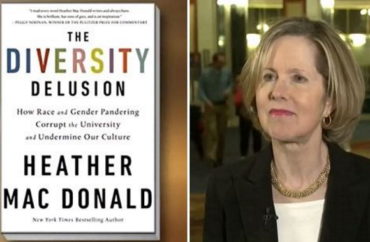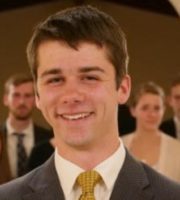
Conservative scholar Heather Mac Donald had to deal with an unruly student protest during her talk at College of the Holy Cross in November, but more recently she took heat from the college’s dean of students as well.
Mac Donald, a fellow at the Manhattan Institute, gave a talk in mid-November on the deteriorating state of higher education, but about 15 minutes into the speech a crowd of students stood up and left, chanting “my oppression is not a delusion” “your racism is not welcome,” and “you are not welcome” among other expressions.
The protestors had arrived early and took up as many seats of the auditorium as they could until it was at capacity. The protest effectively blocked many others who wanted to listen to the talk by filling up the venue’s seats.
Mac Donald detailed the situation in a Nov. 26 op-ed in The Wall Street Journal headlined “Why Are College Students So Afraid of Me?”
In response, the dean of students at Holy Cross, Michele Murray, took up the banner for the protestors by writing a letter to the editor in the Journal applauding them for their disruption.
In the Dec. 3 letter, Murray wrote “I would suggest to Ms. Mac Donald that the students who interrupted her talk for all of three minutes weren’t afraid of her, they just disagreed.”
“[Their] education requires them to wrestle with a wide range of ideas,” Murray stated, “which sometimes means engaging speakers with controversial messages, as with Ms. Mac Donald. And sometimes, it means making use of their own free speech to combat objectionable ideas.”
Murray also claimed that the subtext of Mac Donald’s talk was that “discrimination no longer exists, or at least that we should not be bothered by it.”
Asked by The College Fix to respond to Murray’s criticism, Mac Donald replied: “There was no ‘subtext’ to my talk. Its meaning was plain: Students at Holy Cross and every other American college are not victims; they are surrounded by well-meaning adults who want all of them to succeed.”
“Had the students actually been willing to combat my ideas,” Mac Donald told The Fix, “they would have listened to my talk and asked questions at the end designed to expose my perceived errors. Instead, they dramatically walked out, leaving half the auditorium empty.”
In response to Murray’s notion that Mac Donald was “rushing to claim the mantle of victimhood,” the scholar responded: “This charge is now reflexively directed to anyone who merely describes a student protest against himself.”
“The only arguable victims of the Holy Cross chanters were the dozens of students whom the protesters deliberately kept out of my talk by occupying seats that the protesters had no intention of maintaining,” Mac Donald said.
The controversy continues to serve as fodder for debate in the pages of The Wall Street Journal.
On Dec. 16, the Journal published a letter to the editor from Holy Cross political science Professor David Schaefer, who wrote “Murray disingenuously dismisses protesting students’ interference with Ms. MacDonald’s talk as a mere three-minute ‘interruption.’”
“In fact, the protesting students planned in advance to occupy as many seats in the small lecture hall as possible to prevent students and faculty who were interested in hearing the talk from doing so. Campus security officers (doubtless acting on instructions from higher authorities) didn’t allow any of those who remained outside to enter in their place.”
“In a sense, the strategy ‘worked,’” Schaefer wrote. “But neither the strategy nor Ms. Murray’s letter can obscure the fact that this restriction of academic freedom was one of the most shameful events in Holy Cross’s long history as a college of liberal arts.”
For her part, Mac Donald said Murray’s pride in the Holy Cross students who drowned out her talk with chants of “my oppression is not a delusion” is misplaced.
“The chanters’ embrace of maudlin victimhood does not reflect well on the school’s ability to help students achieve an evidence-based understanding of the world,” she told The Fix.
Murray did not respond to repeated requests from The College Fix for comment over the last 10 days.
She was, however, quoted in a Dec. 14 Telegram & Gazette article concerning new free speech policies on college campuses. “That’s such a critical question for all of us,” she said. “Many folks are comparing what we’re seeing today to the social upheaval that happened in this country in the late ’60s.”
According to the Gazette: “At Holy Cross, where college officials are in the process of drafting a ‘philosophy of freedom of expression,’ Murray described the undertaking as community-based. The statement has already been endorsed by student government, for instance, and next goes to the faculty assembly for approval.”
Murray said concerning the whole freedom of speech issue, “All of this is very complicated.”
In an open letter to the Holy Cross community dated Dec. 13, Murray stated that the Mac Donald incident highlighted “the tension that sometimes arises when the College pursues its dual commitments to both freedom of expression and care for one another.”
“The question is: Where do we go from here? The difficult work ahead of us will be to find ways to bring together those who hold various, and sometimes conflicting, perspectives for productive dialogue,” Murray continued. “This effort has begun and will continue because we believe this is the best way to air multiple perspectives while ensuring that people feel heard and valued.”
MORE: Shouting protestors restrict access to Heather Mac Donald speech at Holy Cross
Like The College Fix on Facebook / Follow us on Twitter





Please join the conversation about our stories on Facebook, Twitter, Instagram, Reddit, MeWe, Rumble, Gab, Minds and Gettr.